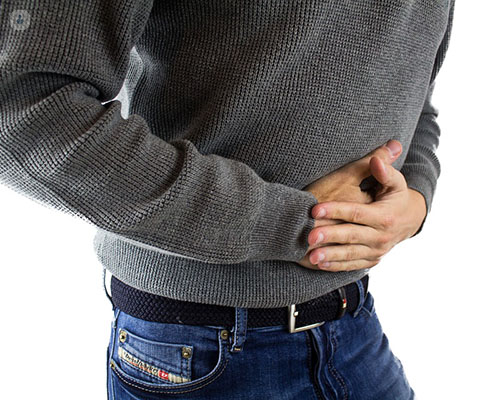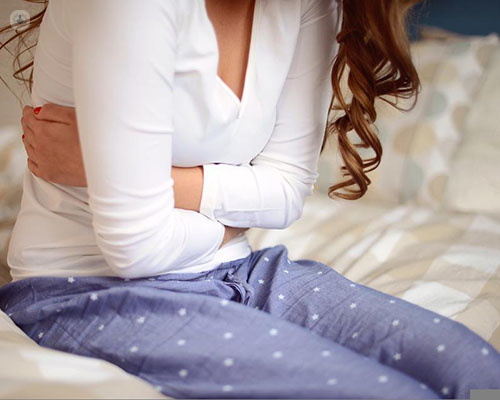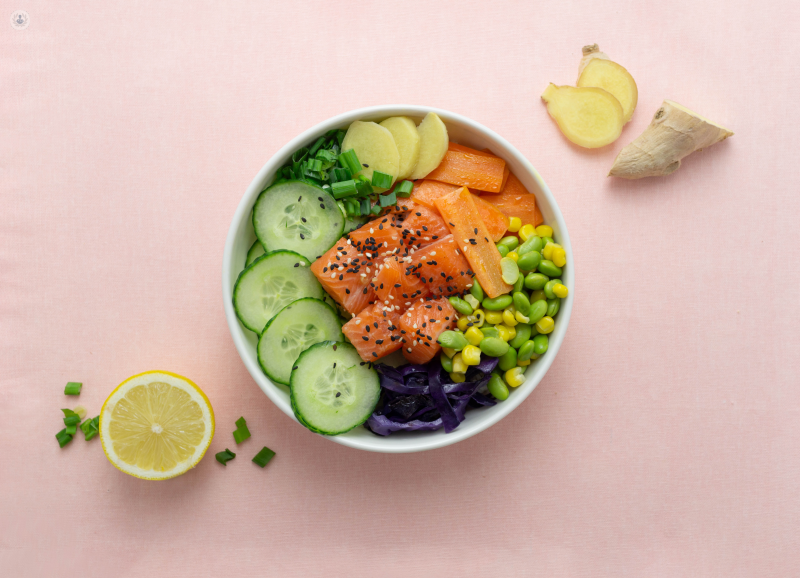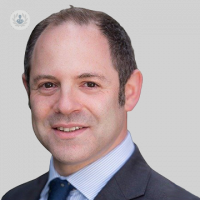Diverticular disease: everything you need to know
Written in association with:Diverticular disease is a bowel condition that commonly affects elderly people. In his latest article, renowned London-based colorectal surgeon Mr Colin Hart explains everything you need to know about this disease, including its symptoms, causes and treatment.
What is diverticular disease?
Diverticular disease is a permanent, progressive and irreversible condition of the large bowel (or colon), in which little pockets of bowel lining bulge out through weak spots in the muscle wall. As the colon pushes motion along its length, pressure builds up inside the tube, which pushes out the lining to form these pockets. It can also cause the thickening and lengthening of the bowel.
What are the risk factors for diverticular disease?
It is thought that the risk factors for diverticular disease include long-term constipation, disorders in the smooth muscle of the bowel wall and a diet poor in roughage or whole grain fibre.

What symptoms may occur with diverticular disease?
Patients often find out they have diverticular disease incidentally when their doctor investigates for other conditions. Often the presence of pockets can cause pain in the pit of the stomach or the left lower quarter of the abdomen before a bowel movement. Patients often complain of an erratic bowel habit, passing anything between liquid diarrhoea to small rabbit pellets. Other symptoms include bloating, the passage of blood or mucus, or a feeling of incomplete emptying.
These are the most common symptoms we see in people with diverticular disease, but occasionally, the affected bowel segments can become suddenly inflamed. This causes diverticulitis, which is an emergency condition. This complicates the presence of the diverticular disease, causing constant pain in the abdomen, often in the lower half of the abdomen and may be associated with fever and flu-like symptoms.
What are the possible complications of diverticular disease?
A bad inflammation can cause a perforation of the bowel. This can lead to collections, which are abscesses in the tummy. The presence of these abscesses or passage of bowel content into the abdomen, causes peritonitis and sepsis and can make people feel very unwell.
Repeated bouts of diverticular disease can also cause a narrowing of the bowel called a stenosis. Eventually, this can be so severe that it causes an obstruction and the patient isn't able to pass wind or motion at all.

One of the nastiest complications of diverticular disease and diverticulitis is the formation of something called a fistula. A diverticulum can become inflamed, and as things that are inflamed become sticky, the bowel may attach to a nearby organ (for instance, the bladder, the vagina, or another segment of the bowel). The inflamed attached pocket essentially burrows into an adjacent organ, which can allow the passage of bowel contents and wind into this organ, causing the patient to experience horrible symptoms.
What is the role of diet in the treatment of diverticular disease and diverticulitis and when is surgery necessary?
Diverticular disease and diverticulitis have very different treatments.
Diverticulitis is a sudden deterioration, compounded by infection and inflammation and should be treated in the Emergency Department. It often requires strong antibiotics, intravenous fluids, bowel rest and painkillers. It will be treated on an immediate and emergency basis.
In terms of background diverticular disease, there are only two options. The first option is a conservative or non-operative option, where we try a variety of medications as adjuncts to help symptoms, as well as addressing the lifestyle of the patient. I will observe how effective these treatments are in relieving a patient’s symptoms before considering surgery, the only other treatment for diverticula disease.
The surgical treatment for diverticular disease involves removing the most affected part of the bowel, via keyhole or open surgery and wherever possible, joining it back together. Sometimes in very complex diseases or in frail patients, this will be done as a staged procedure.
One of the possible complications of removing a part of the bowel and joining it up again, is a leak in the join. This occurs in up to 5% of cases and makes the patient feel very unwell.

If the leak is bad enough to allow faeces into the abdomen, they must undergo a further operation and may end up with a bag, hopefully temporarily.
Surgery is usually only recommended if the patient is suffering greatly, and the benefits outweigh the possible risks. Two major bouts of diverticulitis where the bowel has popped or a collection has formed, would normally suggest an operation is necessary.
There is very good evidence from a variety of sources that whole grain fibre in particular helps to arrest the progression of diverticular disease. We know that patients with diets that are high in whole grain very rarely end up with diseases of the colon and rectum, such as diverticular disease, colon cancer, prolapses, haemorrhoids, fissures, or fistulas.

I always advise patients to try and increase their whole grain intake - when something is whole grain, it is usually the first word mentioned on the ingredients list.
A daily intake of 30 grams of whole grain fibre is ideal to help with reversing the effects of constipation and allowing the passage of motion through the bowel more easily. This movement is also helped by avoiding dehydration so the colon doesn’t take water from the bowel contents, leaving it soft and easy to pass. I also advise that patients try to take a different probiotic every day. This of course can get expensive, so I advise things like kefir, Yakult, Actimel, and probiotic yoghurts. Supplements are also available in the form of chocolates, gummies and sachets.
There isn't yet a huge amount of hard evidence for them, but it does seem to make sense from a medical point of view to try and restore the good bacteria (microbiome) in the gut. We are only just starting to understand the role of the microbiome, but it has a definite role in the prevention of other diseases such as breast cancer, arthritis, strokes and heart disease.
Some people with diverticular disease also have coexisting irritable bowel syndrome which can manifest similarly to diverticula disease with bloating, pain, or irregular bowel habits.
Some people find that taking peppermint oil capsules is beneficial, or taking an antispasmodic also helps with their symptoms.

We advise patients to undergo surgery when they find that their symptoms are so awful that they're unable to carry on with their normal lives. The caveat here is that up to 30% of patients that undergo this surgery still have the same or similar pain after the procedure.
How long does diverticular disease last and do diverticula disappear after treatment?
As mentioned previously, it’s a progressive, permanent and irreversible disease. Diverticula never really go away unless we physically remove them. However, patients’ symptoms can usually be managed by the lifestyle changes and medications mentioned above. I will talk to my patients about this first to try and avoid the risks of major surgery wherever this is safe and appropriate.
Mr Colin Hart is a consultant colorectal surgeon, with over 15 years of experience. If you have any colorectal concerns, please don´t hesitate to request an appointment with Mr Colin Hart via his Top Doctors profile today.


